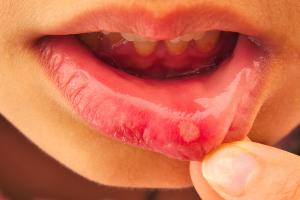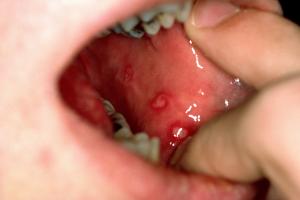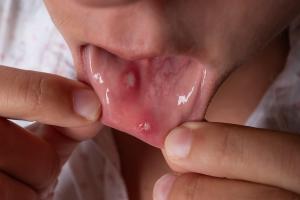Mouth ulcers
Mouth ulcers are painful sores that appear in the mouth. Although uncomfortable, they’re usually harmless and most clear up by themselves. They are common and can usually be managed at home, without seeing your dentist or GP. Visit your pharmacist first, unless your ulcer has lasted longer than three weeks.
About mouth ulcers


Mouth ulcers usually appear inside the mouth on the:
- cheeks
- lips
- tongue
They appear as round or oval sores with:
- a clearly-defined margin (border)
- yellowish-grey area in the centre
- red inflammation around them
It's possible to have more than one mouth ulcer at a time and they may spread or grow.

Mouth ulcers shouldn't be confused with cold sores.
Cold sores are small blisters that develop on the lips or around the mouth.
They often begin with a tingling, itching or burning sensation around your mouth.
Rarely, the same virus (herpes simplex) that causes cold sores, can cause recurring pinhead-sized ulcers inside the mouth, occurring in the same place each time.
When to see your pharmacist, dentist or GP
Mouth ulcers can be painful.
They can make it uncomfortable to eat, drink or brush your teeth.
It's usually safe to treat mouth ulcers at home.
You can buy several types of mouth ulcer treatment from a pharmacy.
Speak to your pharmacist about the best treatment for you or your child.
See your GP or dentist if:
- your mouth ulcer has lasted three weeks
- you keep getting mouth ulcers
- your mouth ulcer becomes more painful or red – this could be a sign of a bacterial infection, which may need treatment with antibiotics
Mouth ulcers are also a possible symptom of a viral infection that mainly affects young children, called hand, foot and mouth disease.
Speak to your GP or call GP out of hours service if you're unsure.
How to treat mouth ulcers
Mouth ulcers don’t usually need to be treated. They tend to clear up by themselves within a week or two.
Treatment can help to reduce swelling and ease any discomfort.
This may help if you keep getting mouth ulcers, or your mouth ulcer affects eating and drinking.
Self care
Things you can do to speed up healing include:
- applying a protective paste recommended by your pharmacist
- using a soft toothbrush to brush your teeth
- avoiding hard, spicy, salty, acidic or hot food and drink until the ulcer heals
- using a straw to drink cool drinks
- avoiding things that may be triggering your mouth ulcers
Medicines from your dentist or GP
If necessary, your GP or dentist may prescribe a course of corticosteroids. This is to help reduce pain and swelling, and speed up healing.
Corticosteroids are available on prescription as tablets, mouthwash, paste or spray. They are not suitable for children under 12.
Mouth cancer
In a few cases, a long-lasting mouth ulcer can be a sign of mouth cancer.
You should see your GP if the ulcer or swelling in your mouth lasts longer than three weeks, particularly if it is painful or bleeding.
It is important to get anything that’s causing concern checked out. This is particularly so if you are over 45 years of age and have a risk factor.
Risk factors for mouth cancer include:
- smoking or using products that contain tobacco
- drinking alcohol – smokers who are also heavy drinkers have a much higher risk compared to the population at large
- infection with the human papilloma virus (HPV) – the virus that causes genital warts
It's important to detect mouth cancer as early as possible. If mouth cancer is detected early, the chances of a complete recovery are good.
Regular dental check-ups are the best way to detect the early signs.
Causes of mouth ulcers
In many cases, the reason for mouth ulcers is unclear. Most single mouth ulcers are caused by damage to the lining inside the mouth. For example:
- accidentally biting the inside of your cheek or a sharp tooth
- poorly fitting dentures
- hard food
- a defective filling
It’s not always clear what causes mouth ulcers that keep returning, but triggers are thought to include:
- stress and anxiety
- hormonal changes – some women develop mouth ulcers during their monthly period
- eating certain foods – such as chocolate, spicy foods, coffee, peanuts, almonds, strawberries, cheese, tomatoes and wheat flour
- stopping smoking – when you first stop smoking, you may develop mouth ulcers
Your genes are also thought to have a role. Around 40 per cent of people who keep getting mouth ulcers report it runs in their family.
Medical conditions
Mouth ulcers can sometimes be caused by certain medical conditions, such as:
- viral infections – including the cold sore virus, chickenpox, and hand, foot and mouth disease
- vitamin B12 or iron deficiency
- Crohn's disease – a long-term condition that causes inflammation of the lining of the digestive system
- coeliac disease – a common digestive condition where a person has an adverse reaction to gluten
- reactive arthritis – a condition that causes inflammation in various places in the body, usually as a reaction to an infection
- weakened immune system – for example, due to HIV or lupus
- Behçet's disease – a rare and poorly understood condition that also causes swelling of the blood vessels
Medications and treatments
Mouth ulcers can sometimes be caused by certain medications or treatments, such as:
- non-steroidal anti-inflammatory drugs (NSAIDs). such as ibuprofen
- nicorandil – a medication sometimes used to treat angina
- beta-blockers – used to treat conditions such as angina, high blood pressure and abnormal heart rhythms
- a side effect of chemotherapy or radiotherapy – this is known as mucositis
Preventing mouth ulcers
It may not be possible to prevent mouth ulcers, because they're often caused by things you can't control. This includes family history or a medical condition.
The following may help to reduce your risk of developing mouth ulcers:
- avoiding certain foods – such as chocolate, spicy foods, coffee, peanuts, almonds, strawberries, cheese, tomatoes and wheat flour, if they cause you to have an ulcer
- not chewing gum
- brushing your teeth with a soft-bristled brush, which may reduce irritation in your mouth
- reducing stress and anxiety – which may be a trigger for some people
More useful links
The information on this page has been adapted from original content from the NHS website.
For further information see terms and conditions.